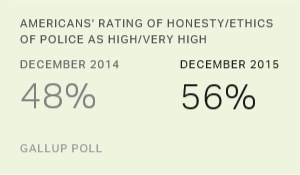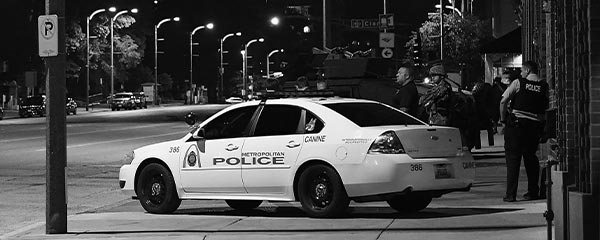Story Highlights
- Majority again rate police highly on honesty, ethical standards
- Figure had fallen to 48% in 2014, after plunge among nonwhites
- Nurses retain top spot as the most highly rated profession
PRINCETON, N.J. -- After dipping to 48% in 2014 amid a national firestorm over police treatment of young black men, the rating Americans give the honesty and ethical standards of police has rebounded to 56%. This is more consistent with the 54% to 58% ratings Gallup found between 2010 and 2013.
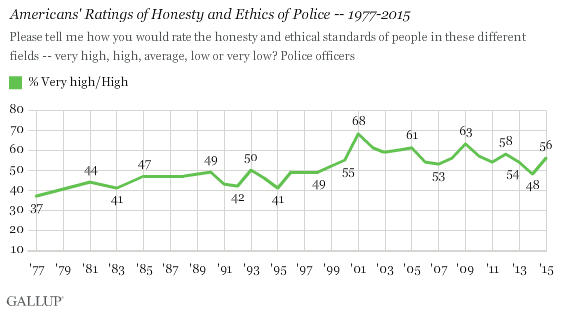
Four in 10 nonwhites now rate the ethical standards of police as very high or high -- a sharp increase from the 23% who held this view in 2014. A steep drop in nonwhites' ratings of the police in 2014 was the sole cause of the profession's overall ratings dip last year. While nonwhites' attitudes have not rebounded to their pre-2014 levels, the slight increase in whites' positive views of the police this year, from 59% to 64%, coupled with the rise in nonwhites' ratings, pushes the overall percentage back to the "normal" range seen in recent years.
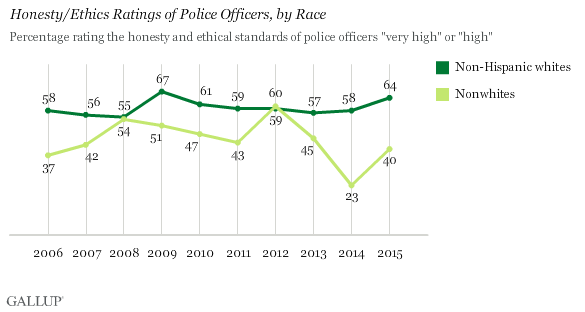
This year's results are based on a Dec. 2-6 poll in which Gallup asked Americans to rate the honesty and ethics of the police and workers in 20 other professions.
Nurses Still No. 1, Congress Among the Lowest
Nurses have topped Gallup's Honesty and Ethics ranking every year but one since they were added to the list in 1999. The exception is 2001, when firefighters were included on the list on a one-time basis, shortly after the Sept. 11 terrorist attacks. (Firefighters earned a record-high 90% honesty and ethics rating in that survey.)
With an 85% honesty and ethics rating -- tying their high point -- nurses have no serious competition atop the Gallup ranking this year. Pharmacists and medical doctors constitute the next tier, with about two-thirds of Americans viewing each highly, followed by high school teachers at 60% and police officers at 56%.
Less than half of Americans consider clergy (45%), funeral directors (44%) or accountants (39%) to be highly ethical. Still, Americans are much more likely to view these professions positively than negatively.
Journalists, bankers and building contractors have closely split images, while lawyers, real estate agents, labor union leaders, business executives, stockbrokers, advertising practitioners and car salespeople all have low "high/very high" ratings and are more likely to be viewed negatively than positively. Still, at least four in 10 Americans consider the honesty and ethics of these professions to be "average," rather than low. On the other hand, there is little good news in the numbers for members of Congress, telemarketers and lobbyists. Solid majorities of Americans consider the honesty and ethics of these professions to be low or very low, while fewer than one in 10 believe they have high ethics.
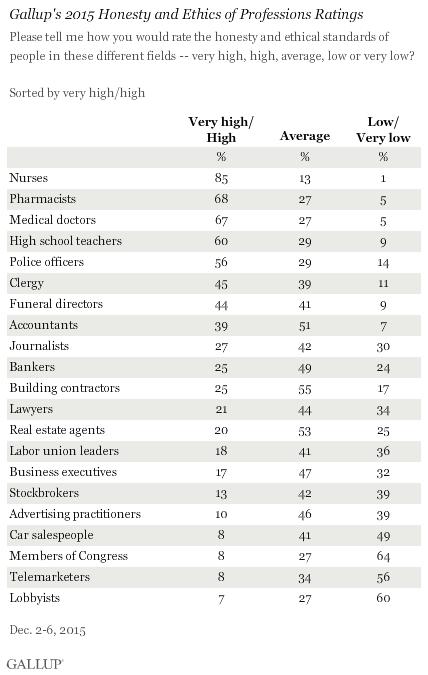
It is noteworthy that the clergy continue to earn their lowest ratings since Gallup first asked this question in 1977. Since 2013, less than half of Americans have believed clergy have very high or high honesty and ethical standards, with the 45% measured this year being the lowest yet.
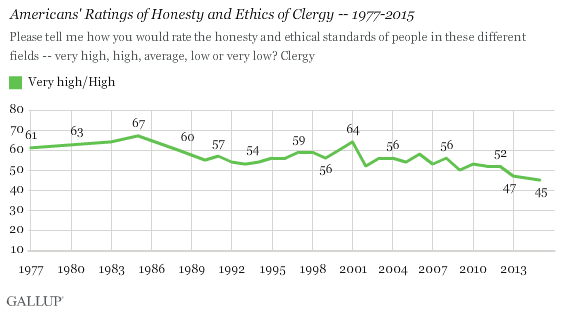
Bottom Line
The overall image of the police is largely restored to what it was before incidents in Ferguson and elsewhere in 2014 spawned the "Black Lives Matter" movement against police behavior. However, it is a tenuous recovery as the police's rating among nonwhites is still not fully repaired. That could partly reflect additional controversies over police behavior that have erupted in 2015, including the death of Freddie Gray -- a young black man who died while in police custody in Baltimore. As long as events like these continue to make news or spread through social media, the police's image may continue to suffer among minorities, even if the profession's overall image remains high because of whites' positive views.
Meanwhile, the clergy's image continues to sag. Even the popularity of Pope Francis has yet to undo the damage that declining religiosity and numerous church and televangelist scandals over the years have seemingly done.
Members of Congress, lobbyists and telemarketers have shown no improvement at the bottom of the list, while nurses, pharmacists, medical doctors and high school teachers remain untarnished at the top.
Historical data are available in Gallup Analytics.
Survey Methods
Results for this Gallup poll are based on telephone interviews conducted Dec. 2-6, 2015, with a random sample of 824 adults, aged 18 and older, living in all 50 U.S. states and the District of Columbia. For results based on the total sample of national adults, the margin of sampling error is ±4 percentage points at the 95% confidence level. All reported margins of sampling error include computed design effects for weighting.
Each sample of national adults includes a minimum quota of 60% cellphone respondents and 40% landline respondents, with additional minimum quotas by time zone within region. Landline and cellular telephone numbers are selected using random-digit-dial methods.
View complete question responses and trends.
Learn more about how Gallup Poll Social Series works.
